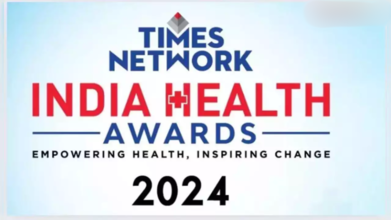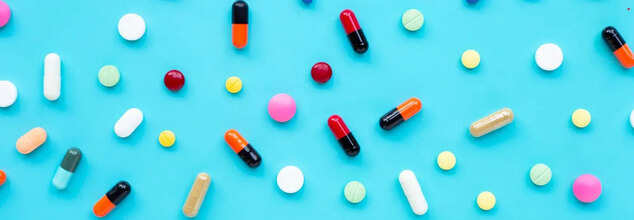
Times Network India Health Awards 2024 Honors Pioneers In Healthcare Innovation
The Times Network India Health Awards 2024, held on August 3rd in New Delhi, honored the outstanding contributions and innovations in the Indian healthcare industry. The prestigious event highlighted the significance of artificial intelligence (AI), value-based care, and the adoption of tech for improved accessibility & affordability in shaping the future of healthcare.
In his opening address, Times Network's President & COO- Digital Rohit Chadda, emphasized the transformative power of technology in healthcare and the critical requirement for a robust healthcare system, highlighting the urgent need for resilience and preparedness.
The awards ceremony celebrated the remarkable advancements and contributions made by healthcare organizations and professionals across the country with 50 awards given in various categories at the event.
The Health Awards also marked the launch of Healthandme.com, the new digital arm of Times Network. Owned and operated by BCCL, the website aims to provide reliable, engaging, and easy-to-understand one-stop content on everything health. The platform is developed in collaboration with doctors, healthcare professionals, nutritionists, fitness trainers, and mental health experts, ensuring that the information is both accurate and practical.
“Healthandme.com is designed to be your daily health companion and the go-to destination for every Indian seeking reliable and up to date healthcare information,” Rohit mentioned during the launch.
A memorable segment of the event featured actor and fitness icon, Milind Soman, who shared practical fitness tips to maintain a healthy lifestyle. The actor highlighted the importance of regular health checkups and to bring the focus to the 'gap' between two consecutive health check-ups to work on building a healthier body.
The evening also saw great minds and innovators from the healthcare community leading discussions on future of Indian healthcare, making healthcare sustainable with optimal use of tech and the adoption of tech for improved accessibility & affordability. They addressed the challenges of infrastructure gaps and the need for robust value-based care models.
Here's who won what- Categories with names
1. All India Best Multi-Speciality Hospitals Group, Apollo Hospitals Group, Mr. Madhu Sasidhar - President & CEO - Apollo Hospitals Group
2. All India Best Varicose Veins Hospital, AVIS Hospitals, Dr. Rajah V Kopala - Managing Director & Sr. Varicose Veins Specialist
3. All India Best Multi-Speciality Cancer Care, Apollo Cancer Centres, Ms. Mansi Rajpoot - AVP - Apollo Hospital
4. All India Best Single Specialty Cancer Hospital, HCG - Healthcare Global Enterprises Ltd, Dr. Sachin Trivedi - Director Medical Oncology; Dr. Trinanjan Basu - HOD Radiation oncology; Mr. Nikhil Kulkarni - Sr. Manager Corp Marketing
5. All India Best Liver Transplantation Hospital, Dr. Rela Institute & Medical Centre, Dr. Ilankumaran - CEO
6. All India Best in Paediatric & Child Care, Apollo Children's Hospitals Network, Dr. Karan Thakur - Vice President
7. All India Best Technologically Advanced Oncology Centre, Omega Hospitals, Ch. Haragovind - President - Omega Hospitals Group
8. All India Best Diabetes Care Chain, Dr. Mohan's Diabetes Specialities Centre, Mr. Saravanan Raman - Chief Marketing Officer
9. Leadership in Community Cancer Care (West), Mumbai OncoCare Centre, Dr. Mangesh Mekha & Dr. Abhishek Kakroo - Consultant Medical Oncologists
10. All India Best in Pain Management, Indo British Advanced Pain Clinic, Dr. Vijay Bhaskar - Founder & Director
11. Excellence in Cardiology, Dr. Vanita Arora, Sr. Consultant Cardiology - Apollo Hospitals (Delhi)
12. Excellence in Dental Implants (Hyderabad), Dr. Venkat Ratna Nag, Managing Director - The Dental Specialists
13. Best Liver Transplant Centre in Western India, Sahyadri Hospitals, Dr. Sunil Rao-Group COO; Dr. Manish Pathak, Transplant Anaesthetist
14. Lifetime Achievement Award, Dr. Arvind Lal, (Hony) Brig Dr. Arvind Lal, Padma Shri, Executive Chairman, Dr. Lal PathLabs Ltd
15. Excellence in Cardiology, Dr. Sai Satish, Sr. Interventional Cardiologist, Apollo Hospitals (Chennai)
16. Excellence in Gastroenterology, Dr. Mahesh Goenka - Apollo Hospitals (Kolkata), Director & Head of dept Gastroenterology/GI - Apollo Hospitals (Kolkata)
17. Rising Voice in Dermatology, Dr. Alekya Singapore, Founder & Chief Dermatologist - The Skin Sense
18. Excellence in Neurosurgery, Dr. Gaurav Tyagi, Sr. Consultant - Apollo Hospitals (Delhi)
19. Excellence in Interventional Cardiology (Hyderabad), Dr. J Shiv Kumar, Head of Cardiology Dept
20. Excellence in Otology & Middle Ear Implants (Hyderabad), Dr. Jaswinder Singh Saluja, Sr. Consultant ENT Dept
21. Bharat Health-Tech AI Innovation, Dozee, Gaurav Parchani, Co-Founder & CTO, Dozee
22. All India Excellence in Robotic Surgery in Gynecology, Dr. Rooma Sinha, Chief Gynecologist & Clinical Lead-Gynecology Robotic Surgery
23. Most Valuable Health Tech Company, Human Fractal, AI, Mr. Rajshekhar Pullabhatla
24. All India Best in Organ Transplants, MGM Healthcare, Chennai
25. Excellence in Internal Medicine & Music Therapy (Hyderabad), Dr. Jagannami Sreekanth, Sr. Consultant & Head of the Academics
26. Excellence in Neonatology (North Region), Dr. Avneet Kaur, Sr. Neonotologist & Director - Dept of Neonotology, Apollo Cradle (New Delhi)
27. Excellence in ENT (Hyderabad), Dr. E C Vinaya Kumar, Head of ENT Dept - Apollo Health City
28. Excellence in Hip Replacement Surgeries (Hyderabad), Dr. Balavardhan Reddy R, Sr. Consultant Orthopaedics
29. Excellence in First Aid & Preventive Pediatrics, Dr. Sivarajnini Santosh, Paediatrics & Social Activist, Magna Centres
30. Best Single Specialty Cancer Hospital (West), ACI - Cumballa Hill Hospital, Dr. Rahul Bajpai - Group CEO & Director
31. Excellence in Breast Surgery, Dr. Geetha Kadayaprath, Sr. Consultant Apollo Cancer Centre (Delhi)
32. Excellence in Neurology, Dr. C Rajesh Reddy, Apollo Health City (Hyderabad)
33. Excellence in Neurosurgery, Dr. Alok Ranjan, Apollo Health City (Hyderabad)
34. All India Best Emerging Neurology Hospital, MGM Healthcare, Chennai, Dr. Aakanksha Chandak - Head Doctor
35. All India Best Dental Clinic Chain, Dentzz Dental, Chairman Institute of Internal Medicine, Respiratory & Sleep Medicine
36. Excellence in Internal Medicine, Respiratory and Sleep Medicine, Dr. Randeep Guleria, Sr. Consultant - Apollo Hospitals (Delhi)
37. Excellence in Cardiothoracic & Vascular Surgery, Dr. Niranjan Hiremath, Sr. Consultant - Apollo Hospitals (Chennai)
38. Excellence in Neurosurgery, Dr. Srinivasan Paramasivam, Sr. Consultant - Apollo Hospitals (Chennai)
39. Excellence in Orthopaedic Manual Therapy Practitioner & Osteopath (Chennai), Dr. Balakumaran, Managing Director - Krishna Health Centre
40. Excellence in Cardiothoracic & Vascular Surgery, Dr. Sathyaki P Nambala, Head Cardiac Surgery unit - Apollo Hospitals (Bengaluru)
41. Excellence in Diabetic Foot Specialist & Podiatric Surgeon (Chennai), Dr. Prem Kumar, MD, Chennai Diabetes Foot Care
42. Excellence in Varicose Veins Treatment, Dr. Rajah V Kopala, Managing Director & Sr. Varicose Veins Specialist - AVIS Hospitals
43. Excellence in Fertility Care (Mumbai), Dr. Rohan Palshetkar, Head of Unit, DY Patil Fertility Centre, Bloom IVF
44. Most Promising Company in Pharma - SME, Radhe MedTech Pvt Ltd
45. Best Orthopaedic Hospital (Chennai), MGM Healthcare, Chennai
46. Pioneer in Healthcare AI, Elsevier, Mr. Shanker Kaul, MD, Elsevier - Health Solutions India
47. Excellence in Cardiac Electrophysiology & Pacing (Hyderabad), Dr. Soumen Devidutta, Sr. Consultant Cardiology
48. All India Expert in Robotic Joint Replacement Surgery, Dr. A V Gurava Reddy, Managing Director & Chief Joint Replacement Surgeon - KIMS Sunshine Hospitals
49. Excellence in Trichology (Mumbai), Dr. Suti Khare Shukla, Founder & Chief Dermatologist, SKS Elements of Aesthetics & Dr. Akshat Shukla
50. Best Fertility Pharma Company, Samarth Lifesciences, Samarth Lifesciences Team
51. Excellence in Fertility Care (Delhi), Dr. Suyesha Khanijao, OBGYN, Infertility Specialist
52. Excellence in Integrative Medicine (Hyderabad), Dr. Praveen K Saxena, Managing Director - Dr. Saxena Integrative Medicine
53. Best Health Tech Solution, Fedo.AI, Prasanth Madavana, Co-founder & CEO, FEDO
54. Excellence in Nephrology (Hyderabad), Dr. Aswini Kumar Panigrahi, Sr. Consultant Nephrology

Credit: Canva
Women Are Overmedicated Due To Male-Dominated Drug Trials: Study
Women are frequently overmedicated, which leads to an increased risk of adverse side effects, a recent study conducted by scientists from the University of Chicago and the University of California discovered. This discrepancy arises because drug dosages are typically based on trials conducted predominantly on male subjects. "Drugs are optimized from the beginning to work on male bodies," explained Professor Brian Prendergast, a psychologist at the University of Chicago and co-author of the study. He also added that there was a need to immediately reevaluate the widespread practice of prescribing the same doses to men and women.
Side-Effects Range From Nausea To Seizures
It has long been recognized by scientists and medical professionals that women experience more side effects from medications than men, even when doses are adjusted for body weight. These side effects can range from mild symptoms such as headaches and nausea to more severe reactions like bleeding and seizures. Historically, women were excluded from clinical drug trials due to the mistaken belief that hormonal fluctuations would distort test results.
'Biomedical Science Is Done On Men, By Men'
"For much of the time it’s been practiced, biomedical science has been done by men, on men," said Prendergast. "It even starts in the petri dish: Most cell lines used in early tests are male, and then drugs are tested on male lab animals."It is pertinent to note that since 1993, the National Institutes of Health has mandated the inclusion of both men and women in clinical trials, with stricter enforcement following a pivotal 2014 study co-authored by Prendergast. That study demonstrated that hormonal cycles in female mice did not interfere with drug testing outcomes.
Despite these regulations, women remain underrepresented in many drug trials, and studies that do include them often fail to analyze or publish sex-specific data. Moreover, numerous medications approved before the 1993 mandate remain in use without adjustments for sex-based differences in drug metabolism.
Study Identifies 86 Drugs With Sex Difference
The study was published on June 5 in the journal Biology of Sex Differences. For the trials, Prendergast and co-author Irving Zucker of UC Berkeley analyzed publicly available data from clinical drug studies. They identified 86 drugs that exhibited clear sex differences in metabolism. The findings revealed that women metabolize nearly all these drugs more slowly than men, resulting in prolonged exposure and, in 96% of cases, significantly higher rates of adverse side effects.
The medications examined include widely used drugs such as aspirin, morphine, and heparin, along with common antidepressants like sertraline and bupropion.
While every individual metabolizes medications differently, women generally retain drugs in their bloodstream and tissues longer than men. The liver and kidneys also process drugs at varying rates between sexes, an effect that persists even when dosage is adjusted for body weight.
“The reasons for these big differences are not fully understood, but this is a really striking result and a wake-up call,” Prendergast stated.
Study Proposes Several Recommendations
To address this issue, the study’s authors propose several recommendations. They advocate for the FDA to disclose the gender composition of study participants in clinical trial data, label drugs known to have sex-based metabolic differences, and ensure that this information is integrated into medical education.
"There are a lot of drugs that are prescribed on a ‘one-size-fits-all’ basis, and it’s clear that this doesn’t always work," Prendergast emphasized. "Especially for drugs that we already know have a wide therapeutic range—meaning a broad range of doses can be effective—we could do a much better job of adjusting dosages based on sex."
This approach would involve starting women on lower doses and gradually increasing the amount until achieving optimal efficacy with minimal side effects. "We have an opportunity to do this better," Prendergast concluded. "This information needs to be widely available."

Credit: Canva
8 Foods That May Help Reduce Risk Of Erectile Dysfunction
Eating a well-balanced, nutrient-rich diet can prove to be a magic bullet for your health and well-being, including reproductive health. Certain foods, such as spinach, carrots, and avocados, contain key nutrients that contribute to improved blood flow and hormone balance.
The foods you consume provide essential nutrients that fuel the body, including sexual organs. Some studies suggest that maintaining a well-balanced diet may help reduce the likelihood of erectile dysfunction. Below are eight foods that may support sexual health and testosterone levels.
Fruits & Vegetables That Can Prevent Erectile Dysfunction
1. Spinach
Spinach is a rich source of folate, a nutrient known to enhance blood circulation. Folic acid plays a crucial role in male sexual function, and low levels have been linked to erectile dysfunction. A cup (240 grams) of boiled spinach provides 66% of the daily recommended intake of folate. Additionally, spinach contains magnesium, which promotes blood flow and may reduce the risk of erectile dysfunction.
2. Caffeine
Caffeine may have a role in preventing erectile dysfunction, though research findings are mixed. A 2014 study involving over 3,000 men found that those with a higher caffeine intake (85 to 300 mg per day) reported fewer instances of erectile dysfunction. However, a 2024 review of studies involving more than 51,000 men did not establish a significant link between caffeine consumption and erectile dysfunction.
3. Apples
Apples are high in flavonoids, natural plant compounds that offer various health benefits. A 2016 review identified apples as a top source of flavonoids such as anthocyanins, flavones, and flavanones. Increased consumption of these compounds was linked to a 19% lower risk of erectile dysfunction. Additionally, apple peels contain ursolic acid, which has shown potential in inhibiting prostate cancer cell growth.
4. Avocados
Avocados have long been associated with fertility and sexual health. They are rich in vitamin E and zinc, both of which contribute to sperm quality and testosterone production. A 2024 review suggests that avocados may enhance sexual duration, reduce premature ejaculation, increase attraction, and improve overall sexual satisfaction.
5. Chile Peppers
A 2015 study found that men who preferred spicier foods had higher testosterone levels in their saliva. While this does not confirm that spicy foods directly boost testosterone, the compound capsaicin found in hot peppers may have benefits. A 2013 study suggested that capsaicin stimulates pleasure centers in the brain, potentially enhancing mood and serving as an aphrodisiac.
6. Carrots
Carrots contain carotenoids, which may help improve testosterone production, sperm count, and sperm motility. Given that low testosterone levels are linked to erectile dysfunction, consuming carrots may help manage hormone levels.
7. Oats
Oats contain L-arginine, an amino acid that helps relax blood vessels, potentially improving blood flow to the penis. Some studies suggest L-arginine may aid in treating erectile dysfunction and boosting testosterone levels. Additionally, oats have been classified as an aphrodisiac that may enhance libido.
8. Tomatoes
Tomatoes are packed with antioxidants, including lycopene, which may support sexual and reproductive health. A 2024 review found that individuals with lower lycopene intake had a higher risk of erectile dysfunction. Tomatoes are also rich in vitamin C and polyphenols, which may reduce inflammation and improve blood flow. A 2017 study involving men with infertility suggested that consuming tomato juice for 12 weeks improved sperm motility.
Can Diet Alone Cure Erectile Dysfunction?
While there is limited research on whether diet alone can reverse erectile dysfunction, a 2020 review found that following a Mediterranean diet—rich in fruits, vegetables, whole grains, legumes, and healthy fats—may help prevent the condition.

Credits: Canva
US Healthcare Is Becoming More Unaffordable By The Day
A new poll found that the number of American adults who are unable to afford necessary health care services and medications has reached its highest level since 2021. This is as per an analysis by Gallup and West Health. The findings show a growing gap in access to quality health care, especially between the high and the low-income Americans.
What Does The Data Say?
As per the numbers, 11% of adults in 2024, which makes it around 29 million people were classified as "cost desperate". This means that they lacked access to affordable care and were unable to pay for necessary medical treatments. This figure has increased from 8% in 2021. The survey was conducted form November 18 to December 27. This included responses from more than 6,200 adults.
What Is The Impact On Minority Communities?
The financial burden of health care is affecting certain demographic groups more than others. The percentage of Hispanic adults categorized as cost desperate increased from 10% in 2021 to 18% in 2024. Similarly, 14% of Black adults faced cost desperation in 2024, up from 9% in 2021. In contrast, the percentage of white adults in this category remained steady at 8%.
At the same time, the number of Americans classified as "cost secure"—those who can access and afford quality care—has fallen significantly. Only 51% of adults reported feeling financially secure about their health care costs in 2024, down from 61% in 2022. The decline was especially sharp for Hispanic and Black adults, with only 34% of Hispanic respondents and 41% of Black respondents feeling cost secure, compared to 51% and 54% in 2021, respectively.
Is There A Gap Between Income Levels?
The data also highlight that there is a financial divide in health care access between high and low income households. Among individuals earning less than $24,000 annually, the percentage of those categorized as cost desperate rose sharply from 14% in 2021 to 25% in 2024. In contrast, for those earning $180,000 or more, cost desperation fell from 2% to just 1% over the same period.
Increasing Concerns Over Health Care Affordability
As financial strain increases, more Americans are worried about their ability to afford health care when needed. In 2024, 35% of adults said they would be unable to pay for medical services if required, compared to 29% in 2021. The data suggests that economic pressures are making it harder for people to access timely and necessary medical treatments.
Policy Changes and Their Potential Impact
The affordability crisis is unfolding at a time when key policy decisions could make access to health care even more challenging for many Americans. Medicaid, the largest source of health care coverage in the U.S., is at risk of severe funding cuts under a House-passed budget proposal that could slash up to $880 billion over the next decade. If enacted, such cuts would likely force millions of low-income individuals off Medicaid, exacerbating financial and health disparities.
Additionally, new tariffs proposed by the Trump administration could drive up drug prices. Analysts warn that if major exporters of generic medications, such as India, are affected by these levies, the cost of essential prescription drugs could increase, leading to further accessibility issues.
A Growing Crisis With No Clear Solution
The findings indicate that access to affordable health care is becoming more difficult for millions of Americans, particularly those in lower-income brackets and minority communities. With policy shifts and economic challenges on the horizon, health care affordability remains a pressing concern for many, with no immediate solutions in sight.
© 2024 Bennett, Coleman & Company Limited

